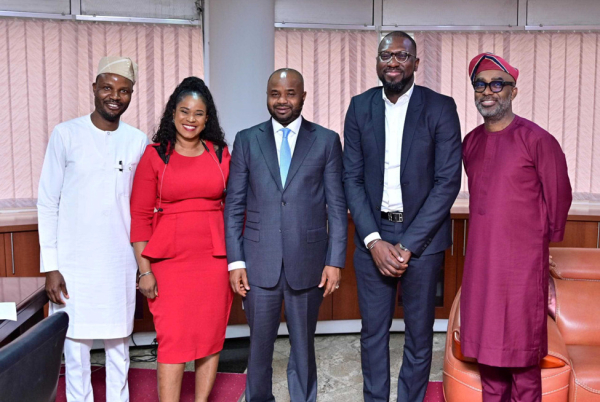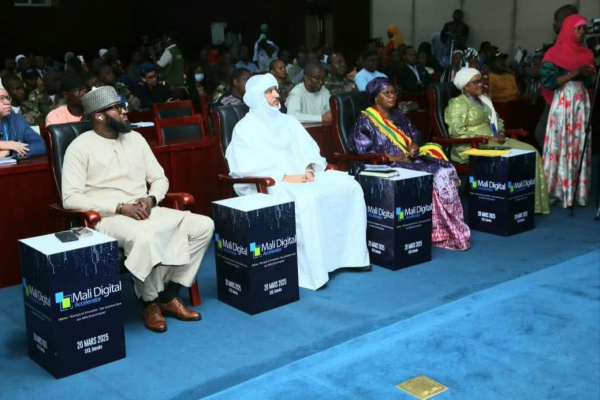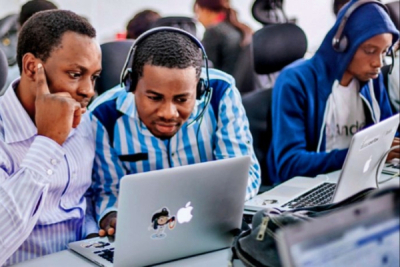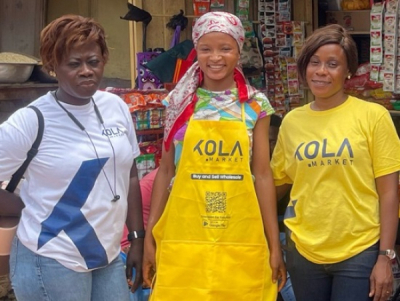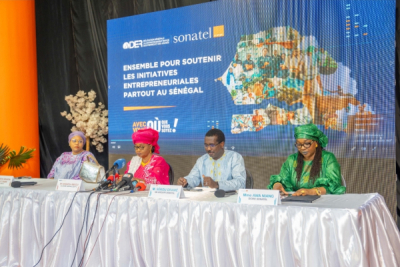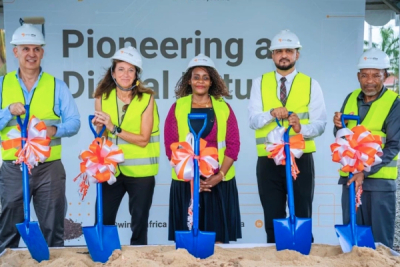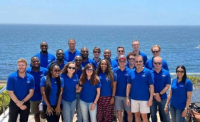Digital payment systems increase transparency, reduce leakages, and provide real-time tracking, ensuring more tax revenue reaches the government. By digitizing tax payments, the collaboration modernizes government collections, improves efficiency, and builds taxpayer trust through greater transparency.
The Nigerian Federal Inland Revenue Service (FIRS) has partnered with African payments technology company Flutterwave to enable digital tax collections. This was announced on March 20. It makes Flutterwave one of the few fintechs modernizing government payments.
Olugbenga ‘GB’ Agboola, CEO of Flutterwave, stated: "We are committed to leveraging technology to drive efficiency and economic growth. By simplifying tax payments, we are digitizing government collections and supporting national development in line with our mission."
Through this integration, businesses and individuals across Nigeria can now pay taxes, levies, and other obligations via Flutterwave’s secure and seamless payment infrastructure. The system offers real-time tracking, diverse digital payment options, offline payment capabilities, and enhanced transparency, ensuring a faster and more accessible tax payment experience.
According to the Nigerian Bureau of Statistics, Nigeria's tax-to-GDP ratio stood at 10.86% as of 2021. The country’s fragmented tax system, which hinders revenue growth, is cited as one of the reasons for this low figure. By digitalizing payments and improving accessibility, the collaboration centralizes tax collection, reduces bottlenecks, encourages compliance, and helps boost government revenue.
This partnership aligns with FIRS’ modernization efforts, which include the adoption of technology for transparency and efficiency, offering Nigerians a streamlined way to fulfill their tax obligations.
Hikmatu Bilali
- The initiative stems from Mali Digital Awards, supporting local startups
- It offers tailored support, funding, and market access, aiming to foster "Made in Mali" digital leaders
The Malian government inaugurated the Mali Digital Accelerator on Thursday, March 20, a program designed to support the development of the national tech ecosystem. The program will provide startups with tailored support, strategic funding, and market access.
The initiative aligns with the government’s ambition to build a strong and resilient digital economy, leveraging technology for economic growth, modernization, and prosperity. The government aims to foster the emergence of "Made in Mali" digital leaders.
According to the Ministry of Communication, Digital Economy, and Administrative Modernization, the program will address challenges faced by sector players, including funding shortages, lack of mentorship, and infrastructure access difficulties.
The International Finance Corporation (IFC) supports this view, emphasizing that accelerators can unlock startup potential in emerging markets. "Accelerators scout for high-growth potential entrepreneurs and provide training, mentorship, and networking, often alongside seed capital. They help entrepreneurs grow their business faster, or recognize when their ideas are not viable, encouraging them to pivot or exit the market. Successful participation in recognized acceleration programs also signals quality to investors, helping promising firms secure additional funding," the IFC said in a report published in February 2025.
The IFC stressed that effective accelerators in low-income countries must align incentives with local market conditions. The institution recommended integrating into regional investment networks, strengthening connections with the local private sector, and fostering angel investment and venture capital networks in lower-middle-income countries.
"Accelerators can focus on specialization and scale in more developed emerging markets—creating industry-specific programs, building cross-border networks for market expansion, and connecting local startups to global value chains," the IFC added.
By Isaac K. Kassouwi,
Editing by Sèna D. B. de Sodji
Nigeria is home to one of Africa’s most dynamic tech ecosystems. However, a slowdown in funding is beginning to hinder the growth of startups. Through new initiatives, the government aims to stimulate innovation and provide essential support to emerging companies.
Nigeria plans to launch a $40 million fund to support early-stage tech startups, aiming to strengthen the country’s entrepreneurial ecosystem and reduce young companies’ reliance on private investors, officials said.
The fund will be equally financed by the Japan International Cooperation Agency (JICA) and the Nigeria Sovereign Investment Authority (NSIA), which manages the national sovereign wealth fund. Kashifu Inuwa Abdullahi, director of the National Information Technology Development Agency (NITDA), confirmed the final agreement would be signed within the next month.
The initiative is part of Nigeria’s Startup Act, adopted in October 2022, which aims to create a favorable environment for startups through tax incentives and financial support. The act established a 10 billion naira (approximately $8.6 million) annual fund to finance certified startups through seed funding, grants, or loans.
According to Disrupt Africa, Nigeria’s startup ecosystem attracted over $2 billion in investments between January 2015 and August 2022, positioning the country as Africa’s leader. Companies like Flutterwave, Andela, and Opay achieved multi-billion-dollar valuations. However, fundraising dropped to $224 million in 2023, down from $531 million in 2022 and over $1 billion in 2021. This decline highlights the need for government intervention to revitalize the tech ecosystem amid investor caution.
The new fund marks a significant step for Nigeria, which aims to foster local innovation. Currently, 12,948 companies are registered as startups, benefiting from a three-year tax exemption. Low awareness of the law’s benefits has prompted the government to plan a nationwide information campaign.
By facilitating access to funding, the initiative could strengthen support for existing startups and stimulate new tech ventures, reinforcing Nigeria’s position as a leading hub for digital innovation in Africa.
By Samira Njoya,
Editing by Sèna D. B. de Sodji
By combining modern technology with an understanding of African market dynamics, this startup aims to empower local entrepreneurs, drive innovation, and create sustainable economic opportunities.
Kola Market is an online marketplace developed by a Ghanaian startup, providing local entrepreneurs with digital tools to optimize business operations and increase profitability.
Founded in 2021 by Marie-Reine Seshie, the startup operates from Newark, United States, and Accra, Ghana.
Kola Market serves as a platform for businesses to sell inventory through efficient online sales channels, increasing visibility and commercial opportunities. The marketplace offers advanced analytics tools, enabling users to access real-time stock level information, identify best-selling products, and analyze customer purchasing trends for strategic decision-making.
The marketplace addresses challenges faced by African small and medium-sized enterprises in the commerce sector, including overstocking, order forecasting, and stock alignment. It automates the ordering process, reducing human errors and ensuring product availability. The platform utilizes artificial intelligence to align stock levels with demand, minimizing losses.
The platform is accessible through a mobile application available on iOS and Android, with more than 1,000 downloads, according to Play Store data. In April 2024, the startup was selected, along with two other startups, to receive $200,000 in pre-seed funding from Madica, an Africa-focused investment program. The funding will enable the marketplace to test new features and expand operations.
By Adoni Conrad Quenum,
Editing by Feriol Bewa
- DER/FJ and Sonatel partner to enhance digital inclusion and innovation
- Under the partnership, Bambey digital campus will become an innovation hub
- Training programs are to be delivered to youth and women through digital hubs and Orange Digital Centers
Senegal's General Delegation for Rapid Entrepreneurship of Women and Youth (DER/FJ) has entered into a strategic partnership with Sonatel, aimed at accelerating digital entrepreneurship. The partnership, formalized on Monday, March 17, seeks to enhance digital inclusion and foster a competitive digital entrepreneurial ecosystem through targeted initiatives.
The project will harness technological innovation to drive social and economic inclusion, with the partners combining resources to cultivate new leaders in the innovation sector. A key component of the collaboration involves transforming the Bambey digital campus into an innovation hub, designed to equip young Senegalese with advanced digital skills for future employment.
The partnership will also include tailored training programs for youth and women, delivered through digital hubs in regional branches and Orange Digital Centers (ODCs). These centers, which officials have noted are effective as business accelerators, will serve as platforms for a dynamic and innovative entrepreneurial environment.
This collaboration aligns with broader efforts to create an environment conducive to local talent development. It also represents a step toward achieving Senegal 2050 and the country's New Technological Deal, the national digital transformation strategy. The New Technological Deal aims to certify five hundred tech startups and create 150,000 direct jobs by 2034.
Sonatel's initiatives, including the Orange Startup Center and Orange Digital Center, have trained over 39,000 young people since 2019, with a reported 95% job placement rate in Senegal. In 2024, Sonatel invested 800 million CFA francs ($1.3 million) in Senegalese startups and supported 1,600 women through its Maisons Digitales program.
By Samira Njoya,
Editing by Sèna D. B. de Sodji
- This marks the second phase of its data center expansion
- The first phase was completed in 2022 with the construction of a Tier 3 data center
Pan-African data center operator Wingu Group announced the second phase of its Dar es Salaam data center expansion on Tuesday, March 18, aiming to better serve its clients' evolving needs.
Wingu's existing Tanzanian data center, certified Tier 3 by the Uptime Institute, ensures uninterrupted maintenance through redundant equipment and circuits. Its power supply and cooling systems utilize multiple redundant paths, limiting downtime to 1.6 hours annually. The facility is carrier-neutral, accommodating all providers.
"Among the key enhancements is doubling in rack power to support energy-intensive applications with superior efficiency. The facility now offers considerably more white space to accommodate additional racks, pods, and cages, ensuring that it can readily grow to meet the increasing demands of modern digital operations," the company stated in a press release.
This expansion seeks to solidify Wingu's position in a rapidly expanding market, fueled by Tanzania's ongoing digital transformation. According to Statista, Tanzania's data center market is projected to generate $108.97 million in revenue by 2025, with an anticipated average annual growth rate of 7.54%, reaching $145.74 million by 2029.
However, Wingu faces competition in Tanzania's data center market. Raxio Group is currently constructing a carrier-neutral Tier 3 data center in Dar es Salaam. Additionally, IT services provider Oman Data Park has signed a memorandum of understanding to build a data center in Zanzibar.
By Isaac K. Kassouwi,
Editing by Sèna D. B. de Sodji
Africa-focused private equity firm Alterra Capital Partners secured, on March 17, a $20 million investment from British International Investment (BII) for its Alterra Africa Accelerator Fund (AAA Fund). The fund, targeting $400 million, supports businesses driving financial inclusion, digital growth, and job creation in East and Southern Africa.
The AAA Fund, which closed its first round at $140 million, is backed by IFC, Norfund AS, DEG, Standard Bank, Allianz AfricaGrow Fund, and Public Investment Corporation.
With BII’s backing, Alterra aims to accelerate sustainable growth across the continent.
Africa has the world’s youngest population, yet a major skills gap threatens growth. Providing digital education ensures economic opportunities for this rapidly growing workforce. By providingscholarships, this initiative directly contributes to closing the skills gap, fostering job creation, and accelerating Africa’s digital transformation.
AltSchool Africa, a talent company that equips Africans with the knowledge, skills, and resources, announced on March 18 that it has partnered with Bybit, a global cryptocurrency and blockchain leader, to sponsor 1,000 scholarships for young Africans, equipping them with in-demand digital skills.
Adewale Yusuf, CEO of AltSchool Africa, stated: “This sponsorship goes beyond a traditional scholarship program. It represents a shared vision for a future where young Africans are not only tech-savvy but also empowered to lead their communities into a prosperous digital age.”
Through this initiative, scholars will enroll in AltSchool Africa’s Diploma program, covering software engineering, data analysis, and product management. The program also includes mentorship, career counseling, and hands-on projects to prepare students for the global tech industry.
Bybit COO Helen Liu emphasized: “Education is key to progress. Through our partnership and the Bybit Academy, we’re committed to fostering innovation and future-proofing Africa’s talent.”
This partnership addresses Africa’s growing digital skills gap, a critical challenge as the continent faces an increasing demand for tech talent. According to the International Finance Corporation (IFC), Africa will need 230 million digital jobs by 2030, yet a significant skills shortage threatens economic growth. By providing 1,000 scholarships, AltSchool Africa and Bybit are helping bridge this gap, equipping young Africans with in-demand skills to thrive in the digital economy and drive innovation across the continent.
Hikmatu Bilali
Proparco and Equity Group, a Kenya based not-for-profit foundation, have signed a €1 million agreement to support the Climate Resilient Agri-Food Systems (CRAFS) project, an Equity Group Foundation (EGF) initiative helping Kenyan smallholder farmers adopt sustainable practices.
The signing took place in Nairobi, on March 18, attended by French Ambassador H.E. Arnaud Suquet, Proparco’s East Africa Director Jean Guyonnet-Dupérat, and Equity Group CEO Dr. James Mwangi.
CRAFS will train 15,000 farmers annually in climate-smart agriculture, covering energy use, sustainable farming, waste-to-energy, and water management. A field team and industry partners will support implementation.
Mastercard announced on March 17 that it is strengthening its partnership with Paymentology, a company that helps banks and fintechs create, manage, and process card payments, to simplify card issuance for South African fintechs.
This collaboration provides the expertise, infrastructure, and speed needed to scale payment solutions, driving financial inclusion and digital growth.
Mastercard offers global payments infrastructure and security, while Paymentology provides cloud-based processing and program management. Their combined expertise ensures faster, more efficient card issuance.
More...
The Malian government is prioritizing digital technology to boost national economic growth. A core component of this strategy is the digitization of public services.
Malian Prime Minister Abdoulaye Maïga launched two digital platforms designed to enhance public service delivery to citizens on Tuesday, March 18. The platforms, "Trésor Pay" and the Land Information System/One-Stop Land Office (SIF/GUF), mark a step in Mali's digitalization efforts.
"Trésor Pay," a collaboration with all Malian mobile money operators, streamlines and secures payments for services including national identity card and passport fees, traffic violations, and fixed fines. Developed by the Support Unit for the Computerization of Tax and Financial Services (CAISFF) with the National Directorate of Treasury and Public Accounting, the platform is already operational at the Directorate General of Transport and the City Hall of Commune IV.
The SIF/GUF platform modernizes land and property procedures, enabling users to complete all land management operations in a single location. The system is slated for implementation across Bamako's seven districts within the year, aligning with the Government Action Program (PAG) objectives.
These platform launches reflect the Malian government's dedication to digitizing administrative services and improving citizen access to public procedures. This initiative follows the recent launch of a digital platform simplifying access to administrative, identity, and travel documents for the Malian diaspora.
Mali has risen 13 places to 141st out of 193 countries in the 2024 United Nations e-Government Development Index (EGDI). However, challenges persist in enhancing the accessibility and efficiency of digital services. The government’s recent initiatives are expected to further improve Mali's EGDI ranking, optimize public revenue collection, and strengthen governance in the coming years.
Samira Njoya
As digital technology rapidly expands in Africa, data sovereignty is increasingly becoming a business imperative. Across the continent, innovative initiatives are emerging, offering localized solutions to ensure regulatory compliance and safeguard sensitive data.
A new cloud platform, 'Door,' developed by Cloudoor in collaboration with Groupement Orange Services (GOS), is set to launch in West Africa, offering a locally developed alternative to existing foreign cloud infrastructure. The platform aims to address data security and regulatory compliance concerns within the region.
"This initiative marks a decisive step toward strengthened digital sovereignty for African businesses. With this sovereign cloud offering, we are providing local economic players with the necessary tools to innovate, grow, and compete globally while maintaining full control over their data," said Aliou Ba, CEO of Cloudoor.
The innovation arrives as data protection becomes a strategic priority for African businesses and governments. PricewaterhouseCoopers' (PwC) "Africa Cloud Business Survey 2023 – Unlocking the Transformational Power of Cloud in Africa" identifies obstacles to cloud adoption, including budget constraints and a lack of high-quality local providers. Despite these challenges, over 50% of African businesses have adopted cloud computing, according to the study.
Cloudoor and GOS designed Door to address these challenges by making data storage more affordable and accessible. The platform utilizes the Tiers III data center infrastructure of GOS, a key component of Orange's African data center network. This data center, built in Grand-Bassam, Côte d'Ivoire, in 2016, spans 16,600 square meters. Door will officially launch in Abidjan on April 24 and in Dakar on April 29, marking a milestone in strengthening digital sovereignty in Africa.
In addition to secure data hosting, Door offers services aimed at accelerating innovation and modernizing African businesses' information systems. The platform includes a managed DevOps offering to optimize development processes and reduce time-to-market, enabling companies to address technological challenges. Door Deploy, a complementary solution, simplifies the deployment of applications, databases, and artificial intelligence (AI) models on GPU servers.
By Samira Njoya,
Editing by Sèna D. B. de Sodji
Digital transformation is one of the priorities of the Ghanaian authorities, who are relying on international cooperation to achieve their goals.
Ghana and Germany discussed strengthening their collaboration in the digital sector during a meeting between Minister of Communication, Digital Technologies, and Innovation, Samuel Nartey George, and a German delegation on March 17.
The talks centered on promoting research and development in digital technologies, supporting information and communication technology (ICT) startups and entrepreneurs in Ghana, and accelerating the adoption of digital solutions.
This collaboration aligns with Ghana's ongoing digital transformation efforts. In late November 2024, the government launched a digital economy policy to leverage technology for growth, improve public services, and ensure equitable access. In October, a $5 million fund was announced to support technological innovation.
Ghana scored 0.6316 on the 2024 E-Government Development Index, ranking 108th out of 193 countries. The country surpasses West African and African averages but remains below the global average. Further efforts are needed in human capital development and online services, where Ghana scored 0.5586 and 0.6084, respectively.
In cybersecurity, Ghana is considered a global model by the International Telecommunication Union (ITU) in its "Global Cybersecurity Index 2024," though further capacity building is needed.
Germany, a global leader in digital transformation, ranked 12th, scored 0.9382 on the E-Government Development Index, well above the global average of 0.6382. On the ICT Development Index, Germany scored 87.8 out of 100.
A joint study by the International Finance Corporation (IFC) and Google predicts Africa's digital economy will be worth $712 billion by 2050, accounting for 8.5% of the continent's GDP. In 2022, Ghana's ICT sector contributed 21 billion cedis ($1.36 billion) to GDP, representing approximately 4% of the economy, up from 4.4 billion cedis in 2016.
By Isaac K. Kassouwi,
Editing by Sèna D. B. de Sodji
Orange, a leading telecommunications provider in Madagascar, is expanding its efforts to enhance user experience. The company is launching a new strategic application within the mobile money sector.
Orange Madagascar introduced Orange Money Pro, a mobile application for merchants and distributors, on Tuesday, March 18, aiming to streamline financial transaction management and enhance the mobile money experience for professionals.
The new application offers faster transaction processing and features tailored to merchants' needs, including real-time transaction tracking, payment management, and improved financial flow visibility.
For distributors, Orange Money Pro simplifies point-of-sale management, banking connections, and access to customer support. Merchants can utilize QR code payments and generate remote payment links. The application, currently available exclusively on Android, has been downloaded more than 10,000 times, according to Google Play Store statistics.
Amidst the growing digitization of payments in Africa and the rise of mobile money, Orange seeks to bolster financial inclusion and simplify business operations. With Orange Money Pro, the French operator is strengthening its position in Madagascar's mobile money sector and may eventually offer advanced financial services to businesses, such as credit solutions or integrated accounting management. Depending on the app's success in Madagascar, expansion to other markets could follow.
However, adoption may be hindered by factors such as internet access rates, which stood at 32.57% in 2023 according to the regulator, merchants' digital literacy, and compatibility with other financial services. These are challenges that Malagasy authorities are working to address.
By Adoni Conrad Quenum,
Editing by Feriol Bewa


